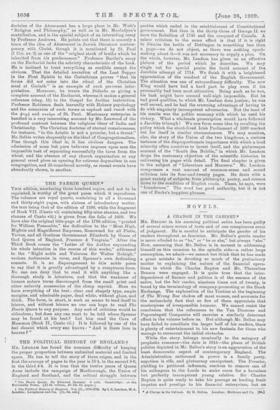THE POLITICAL HISTORY OF LINGLAND.1-
MR. LEADAM has found the common difficulty of keeping the proper proportion between unlimited material and limited space. He has to tell the story of three reigns, and in the first the average of pages to the year is 18.4, in the second 8.6, in the third 4'4. It is true that the twelve years of Queen Anne include the campaign of Marlborough, the Union of England and Scotland, and the critical struggle between • The Faerie QUM, By Edmund Spenser. 2 vcde. Cambridge : at the Bnivereity Press. [J.5 5e. vellum, 23 13,. la paper.] t The Political History of England. Vol. IX., 17024760. By I. B. Leadam, Louden Lengmaus and Co. 178. 0(1. net.]
parties which ended in the establishment of Constitutional government. But then in the thirty-three of George II. we have the Rebellion of 1745 and the conquest of Canada. A minor criticism to the same effect is that if it is right to dismiss the battle of Dettingen in something less than a page—we do not object, as there was nothing epoch- making about it—it was not necessary to supply a plan. On the whole, however, Mr. Leadem has given us an effective picture of the period which he describes. We may single out for special praise the lucid account of the Jacobite attempt of 1714. We finish it with a heightened appreciation of the conduct of the English Government. The situation was one of extraordinary difficulty. The new King would have bad a bard part to play even if his personality had bean most attractive. Being such as he was, his task might have seemed well-nigh impossible. But he had good qualities, to which Mr. Leadam does justice ; lie was well served, and he had the crowning advantage of having to do with singularly incompetent adversaries. Not the least of his merits was the politic economy with which he used his victory. What a wholesale proscription would have followed a Jacobite triumph! We can form some idea by recalling the policy which the short-lived Irish Parliament of 1689 marked dut for itself in similar circumstances. We may mention, also, the story of the Union of the two kingdoms, a curious instance of the disproportionate importance with which a loud minority often contrives to invest itself, and the picturesque account of the " South Sea Bubble," in which Mr. Leadem drops the customary objection of the scientific historian to enlivening his pages with detail. The final chapter is given to the subject of "Literature and Manners." Mr. Leadam compresses a vast amount of common-sense and sound criticism into its four-and-twenty pages. He deals with a great variety of subjects, from philosophy, poetry, and science down to the condition of English roads. These, he says, were " founderous." The word has good authority, but it is not one of Burke's happiest phrases.


























































 Previous page
Previous page